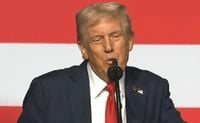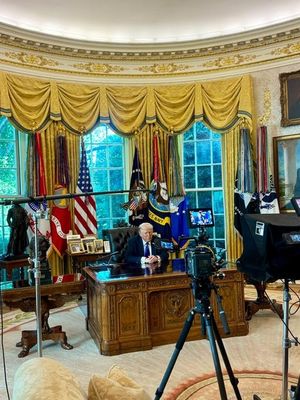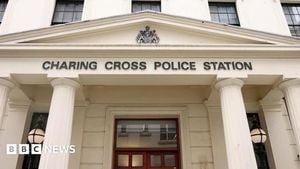On September 30, 2025, an extraordinary assembly unfolded at Quantico, Virginia, where over 800 senior U.S. military commanders gathered to hear from President Donald Trump and Pete Hegseth, now titled the "Secretary of War." The meeting, held just hours before a federal government shutdown, quickly became the epicenter of a national debate about the politicization and polarization of the armed forces, with the rhetoric and proposals aired there reverberating far beyond the military’s own ranks.
Hegseth, known for his combative style and close ties to Trump, opened the proceedings with a fiery address. He railed against what he termed "fat generals," women, "men in dresses," and so-called diversity hires, vowing to return to "male-standard" physical training, prohibit beards, and narrow hazing protections. According to Politico, this was not just another high-level military meeting—it was a full-court press to build consensus against what Hegseth and Trump derided as "wokeness" in the military. Trump, for his part, reinforced Hegseth’s message by touting a proposed $1 trillion military budget for 2026, an eye-watering sum even by Pentagon standards.
The event was described by former National Security Council staffer Peter Feaver, writing in Foreign Affairs, as remarkable not just for its content but for its context: "What made this meeting so notable is that today’s military is buffeted by an atmosphere of extreme partisan polarization." Feaver warned that such partisanship, if allowed to deepen, could lead to cycles of purges and leave the military "disoriented, demoralized, and ineffective, as has happened in other purge-prone militaries."
Inside the hall, the reaction among military brass was mixed. Some officers maintained stoic expressions, but others were less guarded in private. "Could have been an email," one officer quipped to Politico. Another described the gathering as an "inexcusable strategic risk." Retired Lt. General Mark Hertling told MSNBC, "I suspect it’s not being taken well." These comments laid bare the deep divisions already running through the ranks—divisions that have surfaced over issues ranging from shaving policies to the controversial ban on transgender service members, a policy opposed by 56 retired generals and admirals.
Trump’s speech itself was a sprawling, sometimes incoherent mix of boasts, grievances, and threats. At one point, he told the assembled commanders, "If you don’t like what I’m saying, you can leave the room. Of course, there goes your rank, there goes your future, but you just feel nice and loose, OK, because we’re all on the same team." The message was unmistakable: dissent would not be tolerated at the top. He went on to claim, "I rebuilt the military during my first term. It’s one of the greatest achievements. We had the greatest economy in history and I built the military." These assertions were met with skepticism by many, as there was no sweeping "rebuild" of the U.S. military during his first term, and the economic record was far from universally celebrated.
Trump also invoked history, lamenting the change from the Department of War to the Department of Defense as the beginning of "wokeness," a claim that is historically inaccurate. The renaming occurred in 1949, long before the current debates over diversity and inclusion. He further boasted about settling seven wars in nine months—a statement widely dismissed as baseless.
Perhaps most alarming to many observers, including New York Times columnist Jamelle Bouie, was Trump’s repeated framing of American cities—particularly those with large nonwhite populations and Democratic leadership—as "training grounds" for the military to target domestic "enemies." He described inner-city residents as "animals" shooting at firefighters, a claim not supported by recent evidence and widely condemned as racist. Trump said, "It’s a big part of war now, it’s a big part of war. But the firemen go up on ladders and you have people shooting at them while they’re up on ladders. I don’t even know if anybody heard that. And actually don’t talk about it much, but I think you have to. Our firemen are incredible." His remarks conflated urban crime with a call to treat American cities as battlegrounds, stoking fears of militarized domestic policy.
Hegseth’s own address amplified the sense of crisis, calling for the elimination of Geneva Convention rules of engagement and further attacking "liberal and left wokeness." The rhetoric was not lost on commentators. According to CounterPunch, Trump’s speech amounted to a "chilling fascist statement," with the president urging the military to see the country as "under invasion from within" and to prepare for conflict against domestic enemies. Trump said, "Only in recent decades did politicians somehow come to believe that our job is to police the far reaches of Kenya and Somalia, while America is under invasion from within. We’re under invasion from within, no different than a foreign enemy, but more difficult in many ways because they don’t wear uniforms. At least when they’re wearing a uniform, you can take them out. These people don’t have uniforms. But we are under invasion from within."
Trump’s portrayal of Democratic-run cities as lawless, unsafe, and in need of military intervention was paired with promises to "straighten them out one by one," and a pledge to use the National Guard as a "quick reaction force" to quell civil disturbances. He claimed, "We should use these dangerous cities as training grounds for our military, because we’re going into Chicago very soon." Such statements, delivered to the nation’s top military leaders, were interpreted by many as a call for the use of the military against American citizens—a prospect that alarmed both civilian and military observers.
The legal ramifications of such proposals are significant. The Posse Comitatus Act prohibits the federal military from participating in general law enforcement without a state’s consent, providing a legal bulwark in states like California, where courts have already ruled against federal occupations. However, in states such as Louisiana, where Governor Jeff Landry has openly requested federal assistance, the terrain is more favorable for such deployments.
The National Guard’s recent presence in major cities has already led to a spike in deportations and arrests, often for minor or questionable offenses. According to The Guardian, these actions have spurred mass protests and political resistance, with local officials and civilians alike pushing back. One officer told Politico that these deployments "distract warfighters," while at least eleven former generals criticized the Los Angeles occupation. Dozens of deployed troops voiced anger at being used as political pawns, with one describing the assignment as "shitty."
This wave of polarization and politicization has not led to outright revolt within the military, but it has created a climate of disorganization and unease. As Peter Feaver warned, if the military becomes identified with one political faction, it risks triggering cycles of partisan purges and losing its effectiveness. The current moment, marked by mounting abuses of military power and deepening divisions, has prompted many to reflect on the parallels with the aftermath of Vietnam and the decline of U.S. imperial ambition abroad.
While the future of civil-military relations in the United States remains uncertain, the events at Quantico have made one thing clear: the battle lines over the soul and purpose of the armed forces are being drawn not just on distant battlefields, but in the heart of American political life itself.




